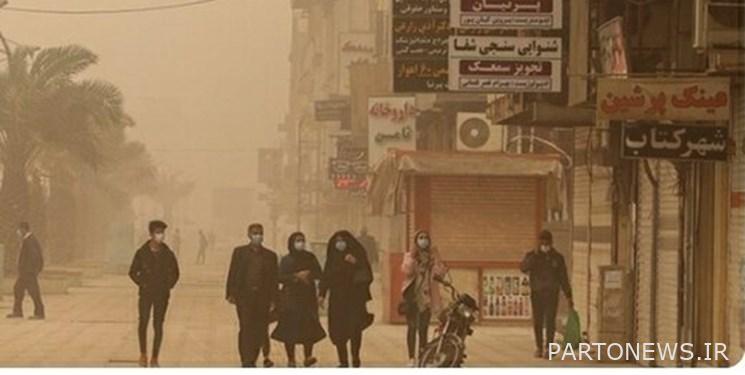As the weather warms, dust will leave the sky of Iran / Control of international centers was not possible with the memorandum

According to Fars Environment Reporter, Dust has been coming from neighboring western countries since late March, and in their latest raid since last Thursday, the skies of 26 provinces have turned gray. The intensity of the dust storm two days ago was such that the concentration of particulate matter less than 10 microns in the capital’s sky yesterday reached an average of 500 and the situation crossed dangerous levels.
Decision-makers in the hours leading up to noon yesterday urged people to refrain from outdoor activities and to avoid contact with the outdoors as much as possible. Indicators had a downward trend until Friday evening and according to the forecast of the Meteorological Organization, will have an upward trend again.
In an interview with Fars News Agency, Dariush Gol-Alizadeh, Deputy Director of the National Center for Climate Change and Climate Change of the Environment Organization, explained the cause of the dust storm in the country and the forecast for the situation to continue in the coming days. It has created a vertical and upward flow of wind that has transported dust to our country.
The Tigris and Euphrates are the main focus of the dust, so the Gap is to blame
Pointing out that the main source of dust in the country is from the west and northwest of the country, he said: “The temperature difference between our country and neighboring countries has led to the acceptance of this dust, but the implementation of the Gap plan in Turkey is the main cause of this phenomenon in the region.”
Gol Alizadeh further stated: The removal of the waters of Syria and Iraq from the two rivers Tigris and Euphrates has caused the drying up and abandonment of agricultural lands around these two rivers, which has turned them into a dust hub.

25 centers of foreign dust and 706 million hectares of domestic lands are the cause of the recent dust
The deputy director of the National Center for Climate Change and Climate Change of the Environment Organization said that the recent storm had 25 dust centers and in addition to these domestic dust centers in 706 million hectares of unmanaged lands in the country, he said: These lands have become centers They have become desert and dust producers.
Gol Alizadeh explained about the continuation of these conditions in the coming days and months as follows: Cutting off the wind flow and increasing the air temperature in the country will control these dusts.
Dust mites settle on cities as the wind stops
He continued: The dust that has entered the cities of the country in recent days settles on the cities by cutting off the wind flow and becomes a secondary pollutant, and if we do not have a suitable green space inside the cities, they can get up with the existing movements. Of course, green space does not mean grass, flowers and plants, only old trees can control dust and prevent it from spreading and re-circulating.

The intensification of the dust phenomenon and the formation of storms and dust storms in some areas and cities of Kermanshah, Ilam, Khuzestan and even Yazd provinces caused the air pollution situation in these cities to reach “dangerous and critical” conditions.
Ali Mohammad Tahmasebi, secretary of the National Dust Control Headquarters, predicted in March last year that dust would rise in the country’s skies by mid-April.
The Secretary-General for Dust Control also stated that “international agencies have a duty” to pursue this issue in accordance with international protocols.
Of course, according to Article 23 of the Clean Air Law, the government is obliged to comply with Article 77 of the Constitution in order to establish regional and international cooperation to prevent the occurrence of dust and reduce its damage and destructive consequences throughout the country. And the region, with the coordination and cooperation of relevant international institutions and the participation of influential and influential countries in the region, took the necessary measures. Meanwhile, the deputy director of the National Center for Climate Change and Climate Change of the Environment Organization announced that the various agreements signed with Iraq to control dust centers have not been concluded due to Iraq’s internal problems.
End of message /
You can edit this post
Suggest this for the front page

